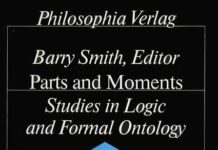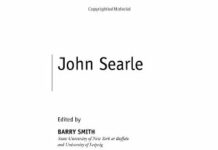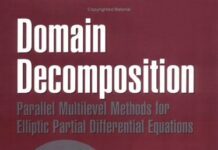
Ebook Info
- Published: 1995
- Number of pages: 533 pages
- Format: PDF
- File Size: 7.02 MB
- Authors: Barry Smith
Description
The essays in this volume explore the full range of Husserl’s work and reveal just how systematic his philosophy is. There are treatments of his most important contributions to phenomenology, intentionality and the philosophy of mind, epistemology, the philosophy of language, ontology, and mathematics. An underlying theme of the volume is a resistance to the idea, current in much intellectual history, of a radical break between ‘modern’ and ‘postmodern’ philosophy, with Husserl as the last of the great Cartesians. Husserl is seen in this volume as a philosopher constantly revising his system in order to be able to integrate philosophy with ideas emanating from science and culture. The so-called rift between analytic and ‘continental’ philosophy emerges as an artificial construct.
User’s Reviews
Reviews from Amazon users which were colected at the time this book was published on the website:
⭐Essays complete and relevant.
⭐I WANT TO SEE THE TABLE CONTENTS OF AMAZON BOOKS!!!
⭐Ever wonder how we can know anything outside our consciousness? Ever wonder what the consciousness is itself, or what structures it possesses? Ever wonder how we can have any objectivity if we live as subjective creatures? If you have then phenomenology may be something that interests you. To explore this topic, one can’t help but encounter Husserl. He founded the discipline and laid broad grounds which must be thought through. Even as a graduate student in philosophy, I find the Husserlian text to be extremely difficult to read. This is not because the material itself is intrinsically hard. Husserl himself stressed the importance of intuitive understand. His ideas, once understood really do appeal to this intuitive understanding of how things are. What makes reading Husserl difficult is that all of the English translations have somehow forsaken good prose for accuracy. This and because the Husserlian corpus is very broad makes phenomenology a little threatening.Enter the Cambridge Companion to Husserl. Succinct, relevant to the field, and applicable to everyday thinking, this book is a wonderful partner for the thinker who is beginning to think phenomenologically. It summarized Husserl’s thoughts clearly so that the beginner can understand. However, it is not Husserl for Dummies! The thoughts expressed are subtle enough, so that new insights can be garnered in rereads of the the essays. All main areas of his philosophy are covered: the epistemology, the derivative ontology, language theory, ideas on math and objectivity.Though not Husserl for Dummies! neither is it Husserl for the Husserlian. As a student, I had the pleasure of studying with two of the authors: David Smith and Rick Tiezen. From personal experience, both men are particularly precise and rigorous with their thinking. Besides teaching at UCIrvine, Smith also teaches elementary school children the fundamentals of philosophy. Both experiences carries in his writings, as he is able to express complex thoughts cogently to experts and laymen alike. As for Tiezen is expertise as both a logician, mathematician and phenomenologist makes his especially qualified to speak on Husserl’s mathematics. Half of professor Tiezen’s time is spent with freshmen in introductory classes. The other half working with ornry graduate students like myself. Both men’s ability to teach high and low shows in their writings, making the Companion a pleasure to read.
⭐”The Cambridge Companion to Husserl” is useful in the following ways. First it helps to somehow finish with the legend that the reason Husserl turned away from psychologism was because of Frege’s review. Secondly there are very good essays on Husserl’s phenomenology, particularly Jakko Hintikka’s “The Phenomenological Dimension” which restores the role of phenomenology not as merely looking for noemas, but to refer and know the object itself, giving an account of the Husserlian difference between sense (meaning) and reference (object). Another good essay was Dallas Willard’s “Knowledge” which accounts for the epistemological dimension of Husserl’s phenomenology.This anthology also accounts for Husserl’s analytical philosophy. From these readings the best essay I could find was Kit Fine’s “Part-whole”, which deals with the often disregarded Husserlian doctrine of the part and whole in the third logical investigation. The other essay that seemed less interesting was Peter Simons’ “Meaning and language”. This essay has the defect of not taking into account the Husserlian difference between “states of affairs” and “situation of affairs” which leads him into many equivocal views on Husserl.However, the worst essay in this anthology was Richard Tieszen’s “Mathematics”. This apparent authority in Husserlian doctrine on his philosophy of mathematics seems to ignore the Husserlian notions of “categorial intuition” and “categorial abstraction” which both are the way in which mathematical and logical objects are known. This is explained in Husserl’s sixth investigation from sections 40-52 and sections 59 to 66. However, Tieszen seems to ignore this and attributes Husserlian mathematical epistemology to an unexplained way that we detect invariants from the flow of experience. Readers should take this into account when evaluating Tieszen’s essay.
⭐The Cambridge Companion to Husserl contains essays by various Husserl scholars who attempt to show the relevance of Husserl’s ideas to many recent issues in philosophy. Barbosa says that I seem to ignore Husserl’s ideas of categorial intuition and categorial abstraction and to characterize Husserlian mathematical epistemology in terms of detecting invariants in the flow of experience. Evidently Barbosa did not read the paper very carefully. Footnote 17 gives some examples of places to look in Husserl’s writings for the view that ideal objects (including mathematical objects) are to be understood as invariants through the variations in our cognitive acts and processes. Many more citations to Husserl’s works could be added to this footnote. In my paper I do not use the terms ‘categorial intuition’ and ‘categorial abstraction’. So I am guilty of not using these terms but I am not guilty of failing to discuss the ideas of intuition and abstraction in mathematics. There are many technical Husserlian terms that I do not use in the paper. I do use the terms ‘intuition’ and ‘abstraction’. In places where I use these terms and describe Husserl’s views on mathematical intuition and the abstractions, idealizations and formalizations involved in mathematics, I also cite Husserl’s texts on categorial intuition and categorial abstraction. An attentive reviewer would only need to see footnotes 16, 19 and 24. Open Husserl’s Logical Investigations, for example, to sections 40-58 and read the Chapter title: Sensuous and Categorial Intuitions.
⭐Vale la pena leerlo, es una buena ayuda para introducirse en este gran pensador. Padre de la FenomenologíaVers useful as a working toolc
Keywords
Free Download The Cambridge Companion to Husserl (Cambridge Companions to Philosophy) in PDF format
The Cambridge Companion to Husserl (Cambridge Companions to Philosophy) PDF Free Download
Download The Cambridge Companion to Husserl (Cambridge Companions to Philosophy) 1995 PDF Free
The Cambridge Companion to Husserl (Cambridge Companions to Philosophy) 1995 PDF Free Download
Download The Cambridge Companion to Husserl (Cambridge Companions to Philosophy) PDF
Free Download Ebook The Cambridge Companion to Husserl (Cambridge Companions to Philosophy)


